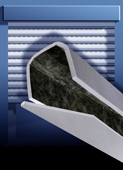Jan 12 2009
In order to retrofit roller shutter casings with thermal and acoustic insulation, BOSIG GmbH, Germany, has turned to BASF’s Basotect®. This lightweight, flame-retardant foam is used in the Rolaflex® system, which simply and cost-effectively provides built-in or walled-in roller shutter casings with energy-efficient thermal and acoustic insulation. Thus, Basotect is making a contribution towards meeting the standards for passive and low-energy houses. Homeowners can lower their heating costs, reduce CO2 emissions and increase the value of their homes. The system will be showcased at the building and construction trade fair BAU 2009 in Munich, Germany from January 12 to 17, 2009: at BASF’s stand in Hall A4, Stand 303 and at Bosig’s stand in Hall A4, Stand 331.

Preventing thermal bridges
The gray, specially coated Basotect strips have a thermal conductivity of < 0.035 W/m .K, so they reliably prevent so-called thermal bridges, in other words, heat losses that can occur when roller shutter casings are inadequately insulated. This measure also improves the living climate, eliminates drafts and reduces sound transmission. Moreover, it prevents mold growth on the walls due to condensation brought about by wide fluctuations in temperature.
Rolaflex is quick and easy to apply: the roller shutter casings are lined with one or more layers of Basotect and the strips are fastened with a pasty, solvent-free adhesive. It is not necessary to replace the windows or roller shutter casings, the system can be flexibly adapted to all kinds of roller shutter systems.
Multifaceted foam
The thermoset melamine resin foam Basotect is now available in several versions and for various applications. Owing to its favorable combination of many properties – it is temperature-resistant and flame-retardant as well as lightweight, flexible, sound-absorbing and thermally insulating – this foam has been employed so far primarily for sound absorption in buildings as well as for the thermal insulation of solar panels, also in rail vehicles, in automotive construction and in the Ariane 5 launcher.